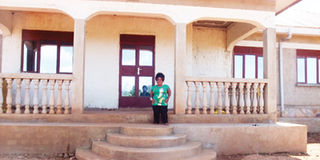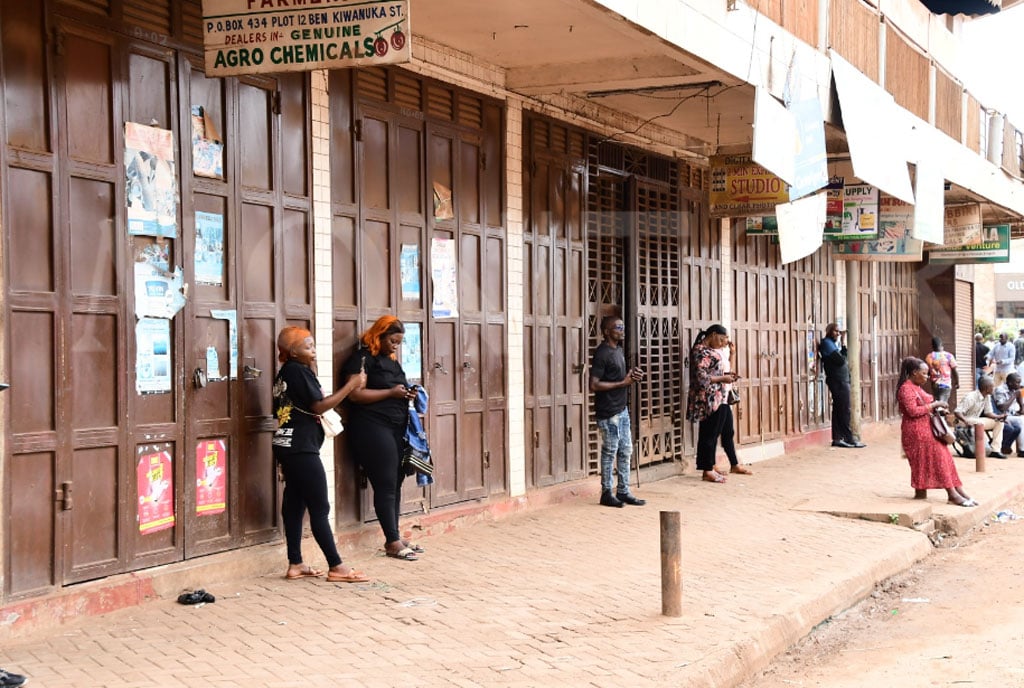For Sarah Short, height aint nothing but a number

Sarah stands proud in front of her home, which she built using money earned from shows in london and a contract with MTN.
Most people pity Sarah Short on seeing her. But this seems to be the last thing on her mind. She’s just as intriguing and confident in her roles as a wife, mother and career woman as any other lady, writes Agnes K. Namaganda.
I find her seated at the rear of her house with about six other people chatting happily at about 11a.m. They seem to have just had breakfast as two of them are doing the dishes. I introduce myself but Sarah Short seems to have forgotten about our appointment. Even then, she comes talk to me.
I don’t know what to expect at this point; whether she’s insecure about her looks and will need me to do some re-assuring (given her physical deformity) to encourage her to talk, or whether she’ll act outrageously in a bid to show that she’s nothing less than ordinary looking mortals.
I can’t help pitying her as she approaches. She’s about two feet tall, has a short lower body with short limbs and her face is larger than ordinary with an upturned nose and dominating forehead. On the whole, all her features seem out of kilter.
I am refreshingly surprised that Sarah Short has allowed me to interview her. She’s comfortable in her skin and this shows when she next comes out of the house. Apart from the white straw cap she throws on, she doesn’t change her outfit. She stays in the “stay-at-home” clothes I find her in. She’s not shy and there’s no trace of insecurity as we talk. If you were to ignore her body, Sarah Short is a wealth of wisdom and maturity. She’s not ashamed of her shortcomings and failures in life and without being asked, admits them in an honest, sincere but not regretful tone.
For example, she tells me she lost her first born son because she used to take him with her for late night shows. Apparently, he got pneumonia because she would sit with him on boda bodas all the way back home after performing. “I was hospitalised when I was five months pregnant and staying in hospital for all that time affected my income. When I was discharged after giving birth, I decided I had to work because I have a huge responsibility.” She looks after 10 orphans.
How many mothers would say this without blaming themselves? But she doesn’t. She believes that with hindsight, she wouldn’t have done it because she lost her son but that at the time, she thought she was doing the best for her family.
She also tells me how she managed to put up such a big house yet she has never had a hit song. Which musician would say that? Again, she tells me that she wasn’t that bright in class so she decided to drop out and later, that composing songs is almost an unscalable wall for her and one of her greatest challenges as a musician. “Sometimes I write a song and the producer cancels lines and replaces them; sometimes I get to the studio and the whole song is a mess so the producer just drops it,” she confesses matter-of-factly without feeling miserable about her probable lack of skill.
Born Sarah Nantongo to Jalia Namawejje and Ibrahim Ntege (deceased), her disability was a challenge both for Sarah and her mother. Her mother told her that people would visit just to gawk at her, only to gossip behind her back. She had breathing problems and had to be hopsitalised for six months. Sarah thinks her mother would have killed her then but she didn’t because she loved her. Sarah is the fourth of 11 siblings, all of whom are normal.
She went to Mawanda Road Primary School in Kamwokya during which time she realised she was different from other children. “My family loved me and protected me so I didn’t realise I had any problem. However, on my way to school, people used to stare at me and some would give me money but I didn’t understand why. Like a child, I simply accepted the money and was very “loaded” at school. Some people were mean and said all sorts of things to me. Some children at school would pick on me as we walked home from school. I am glad I had siblings. They always looked out for me and even carried me on long journeys because I would get tired easily.”
Music career
Sarah proceeded to Emmanuel’s College in Kazo, but by then she’d developed interest in music and drama and never missed shows at local theatres. In S.2, she announced to her mother that she was done with school. Her mother didn’t object. She approached the late Paul Job Kafeero at White Nile Dairies in Katwe where his Kulabako Guitar Singers would meet to practice. This was in 1995. “Kafeero readily welcomed me and by 1997, I had an album of six songs, two of which I bought.”
The song, Nkikugambye was a hit and to date, her fans are very excited when she sings it. However, singing hasn’t been a smooth road for her. “Sometimes you agree with organisers on an amount and after performing they pay you a different one. But I never complain. I avoid such brawls so I just walk away. Other times, they announce you without your knowledge and when you do not appear, your fans complain, yet you knew nothing of the event,” she adds.
Sarah Short partly attributes the success of her career to Lady Titie, who played and marketed her songs during her Ebaluwa programme on Beat FM. “Bobi Wine has also been very helpful. I had a show one day and he gave me instruments together with a Fuso to transport them. He also agreed to perform at my show without any payment, ensuring that I made quite some profit from the show. Sometimes even your brother cannot do such a thing for you,” she points out.
The artistes she respects are Mariam Ndagire for her decency and good voice and the duo of Mowzey and Weasel. “Mowzey can sing,” she animatedly observes, “His voice can turn a bad song into something brilliant because of all the passion he injects in a song.”
How she built her home
Sarah says she bought the land on which her home sits way back when land was cheap. “Land is a real investment because this place was a real bush; I never thought I would live here,” she remarks. In 2007, she got an opportunity to travel to London for a show. “I made a lot of money from tips from the audience; it was much more than what I was paid by the organisers. MTN then contracted me for a year to sing at their shows and paid me Shs1.2m each time I performed. I didn’t waste that money; I started building. It wasn’t very expensive because I made my own bricks with the children I look after.”
Of the orphans she looks after, four are for an elder sister who passed away and six are for deceased friends who took her in when she was still struggling with her music career and had nowhere to live. “When they died, I decided it was time to repay their kindness since I am now well off.”
These children are her main inspiration because every day, she thinks of how best to provide for them. “They are the reason why when I got money, I chose not to buy a car first but to build a home for them. People made all sorts of intimidating remarks in taxis but I sucked it all up.”
At the moment though, she owns a Toyota Delica, but uses a boda when she has no fuel. She’s quick to reprimand musicians who make a lot of money and waste it thinking that tomorrow will be better than today, only to be rudely shocked when they turn into paupers. “I have never had a hit song but I built a house with the first breakthrough I got. Most musicians fail to do this because they keep procrastinating. They buy nice cars that can become history with just one accident. Musicians need to grow up,” she chastises.
Giving birth
The question I have been dying to ask is how she had the guts to get herself pregnant. And her answer makes me fall in love with her. She’s not shy about it. It does not matter what you think of someone in her condition having a good time. She’s not pompous about it either; she tells it like an ordinary tale.
“I was on family planning so when I missed my periods, I thought the contraception was messing up my system. I didn’t think much about it. I realised I was pregnant at five months. Because of my deformity, I decided to seek medical help at Mulago. I was admitted right away till I gave birth.”
Unfortunately for her, scans revealed she was expecting twins right to the time she delivered, only to get one child. This is the boy she lost to pneumonia. After this pregnancy, Sarah wanted to have tubal ligation but her doctors declined, saying her husband should be available to sign the papers. Well, he wasn’t and the operation was not done, something she was grateful for later when she lost her son to pneumonia at the age of one and a half years. Unknown to her, she was pregnant again with her now five-year-old, who is in nursery school and is normal.
“I don’t want more children because doctors have told me that I have high chances of producing one like me, which I don’t want. I know the pain of being in my shoes and I wouldn’t want it for my child. I also went through a lot of suffering in Mulago because of my condition. A music career also gets setbacks when you keep getting pregnant,” she says. She stays with her husband, Mohammed Nkoyoyo, at her home, in Bujjuko off Hoima Road from Nansana.
Aspirations
“If I get more money, I will look after more children, especially those with disabilities. Normal people don’t understand the challenges of living such a life. Looking at an old person who crawls with a brain that doesn’t function well moves me. I keep thinking that if I can walk and my brain is okay and people treat me this way, how about those other people?” she wonders. She has a new song she’s yet to release at the end of the year because she believes it will sell more towards Christmas. She released her Mukama Neyanza album in September last year.
Sarah Short also wants to build a new home on the hill across where she stays when she gets more money. “I built this home primarily for my mother, who was staying in Bwaise. Whenever it rained, water gushed into her house because she was near a drainage channel. I plan to leave her here and get another house,” she proudly tells me.




